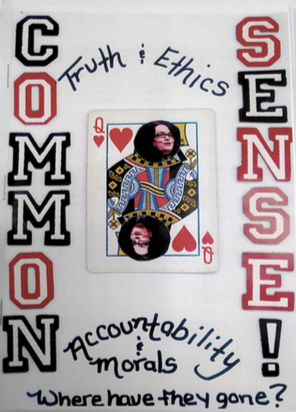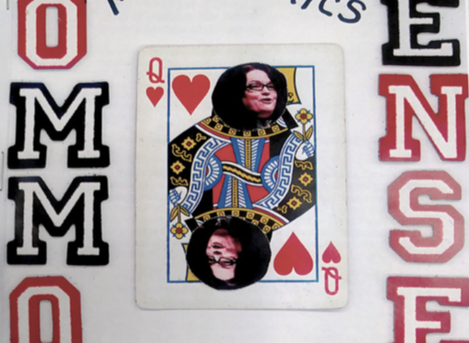By Josh Tolentino
Staff Writer
The Post campus has been in uproar since the OneLIU announcement that the Post and Brooklyn sports teams would merge. Stacks of guerilla pamphlets were left on The Pioneer newsstands, in the Little Theatre, on cork boards in classroom buildings, and in other locations around the school.

The pamphlets open with, “The student body is furious, and We will not longer fall into silent apathy.” They describe the feelings of certain students on multiple issues, including the promise coaches, alleged mold problems and department mergers. The pamphlets demand change and end with, “The good students of LIU Post refuse to simply do nothing any longer.”
The declaration was inspired by Thomas Paine, who helped ignite the American Revolution in his “Common Sense.” Paine wrote a list of demands and encouraged independence from Great Britain. Similar to Paine, the pamphlets seem to imply a sort of coup d’etat. “Spread the word, make sure we’re heard, and dethrone Queen Kimmy NOW.”
The rage of the students has not gone unnoticed by administrators. President Kimberly Cline stated, “Change is not easy, even change that is embraced by University best practices. I appreciate and respect debate and engaging conversation. What does not help the larger conversation are those who may have personal agendas and are comfortable disseminating inaccurate or negative information.”
The president assured students that the administration is not trying to fight the student body and wants to address these issues civilly.
Faculty members, too, have not been silent. “The faculty is coming together in a way that I haven’t seen in many years in opposition to the administration’s policies,” political science professor and president of the faculty union, Michael Soupios said.
One of the main focuses in the pamphlet was Cline’s salary of “around $800,000 per year.” Despite there being no correlation between the cuts and alleged deficit and Cline’s earnings, the anger stems from a lack of knowing.
“When you got a problem, you have a huge budget hole in your operations, and you refuse to acknowledge that, that’s the problem,” Soupios said. “She’s being paid and she’s not doing the job. There is a problem when you’re getting paid and conducting yourself like a tyrant, that’s the problem.”
Faculty and students appear to be in a state of confusion and the chaos has led to backlash.
The pamphlet discusses student issues with the promise office, which was designed to help students with their academic careers. “Broken Promise” as the program was nicknamed by the writer, suffers from a “high staff turnover rate and underfunding.”
Some students decided to do the promise coach’s job for them. Senior digital game design and computer science double major Kyle Duncan found, “a lot of them (promise coaches) slack. A lot of them are hard to get to. I tried connecting mine and she was gone for a month.”
The cries did not go unheard. Cline described the program’s purpose. “We put this program together so that each student would have a personalized coach. In fact the promise coaches have been dedicated [and] trained in special areas.” The objective of the Promise Office is to give a personalized experience to students, which is why the ratio is 1:150, according to Cline.
The program attempts to meet the needs of students. “All of our coaches are at the 150 cap. We are currently searching for two new [residence] hall directors. It’s all about finding the right people,” Michael Berthel, dean of students, said. “We try to pair up our staff with what they’re passionate about.”

Another issue mentioned in the “Common Sense” pamphlet was mold. “From the dorms to the classrooms and offices of Pell Hall there is no respite.”
Duncan, a resident of Post Hall, supported the pamphlet’s allegations. “It’s crazy nothing has been done about it. The fact that they just let it go by. The fact that there are tons of students with this problem.” The pamphlet highlights the importance of this issue because mold can lead to health complications and should be addressed immediately.
Roy Fergus, director of facilities services, said the
facilities team is working as fast as they can to address issues of mold as they are reported.
“The facilities custodial and other staff have been directed to look for any evidence of mold growth in the areas (class- rooms, offices, hallways, stairs, public areas, restrooms, closets, etc.) where they are working; or are responsible for facilities maintenance service(s),” Fergus said in an email. “If mold
is discovered, the custodial staff is mobilized to clean any evidence of it with the established approved cleaning procedure that we have in place,” he continued.
Concerns about athletics were brought up. “All these athletes came to a Division II school with the promise of being able to play Division II and have now had the floor torn out from underneath them.”
Cline responded that the merger of the Post and Brooklyn sports teams “has been talked about for more than ten years” before she arrived at LIU. “At one point we were D1 for a few teams… and so this started before I got here. It has continued to be in conversation. We wanted to move forward when we were in the position that it made sense to move forward with some strength,” she said. The administration deemed that the appropriate time to make this change was when they had enough information to address all student-athletes.
The Paine Poseur included the department mergers. Multiple departments are being consolidated under one chairperson. The Pioneer reported on Sept. 12, 2018, that the English, foreign language and philosophy departments are now merged into one department with Professor John Lutz as chair. The political science, history, economics and sociology departments have also been merged. “Imagine a fashion merchandising student asking a computer science professor for academic advice. What a joke that would be!” the anonymous author lamented in “Common Sense.”
Students have not been informed of the motivation behind the department mergers. Some faculty members have responded.
“It’s because of money, they’re collapsing departments on each other, you’ll come up with savings. From an operational viewpoints students will be sacrificed,” Soupios said. Regardless of efficiency, students have noticed consequences already.
“We’ve been trying to fight for a new computer lab, but it’s almost off the table. With the budget cuts it’s probably going to be a thing in the past,” Duncan said about the needs of the game design program.
The author of the pamphlet called out the newly proposed veterinary school at Post, mainly asking why the accreditation process has proceeded so quickly. “How did LIU Post jump from 12th to 1st on the accreditation list?” How would LIU rival their competitors?
Cline responded to the accusations. “There is a huge need in this community for veterinarians. There are only 30 vet schools in the whole country and there are many more students highly qualified than there are spots so we would only be the 31st.” She stressed the potential the new vet school will have for the university. As for the issue concerning the expedited accreditation process, Cline clarified, “We forwarded a request to the accreditation body to come and review us, they sent a letter back with a date that said we were being reviewed.”
The driving force behind the pamphlet appears to be confusion. Students are unsure of the direction of the school, especially with the perceived financial uncertainty. The pamphlet questioned administration, “Oh, rumor has it Post is $28 million in debt?”
Cline declined that there is a deficit. “There is no $28 million deficit. In the last five years, our university has gone from $86 million to about $230 million in endowment. We’ve had surpluses every year I’ve been here,” she said.
University CFO Christopher Fevola confirmed Cline’s statement, saying that the university is more financially stable and secure than it has been in years.
Some faculty feel that the university’s problems are due, at least in part, to admissions. Enrollment figures analyzed by the Pioneer show a decrease in enrollment from an average of 820 to 550 in the last six years.
“The current administration [is] not being honest in terms of [the] financial situation. They have the wrong people doing the administrative operations; they’re not professionals in enrollment services. They conduct themselves like bullies, they’ve intimidated people, people are afraid to talk, people are afraid to make a policy, everything’s coming from the top. Everyone is terrified,” Soupios said, describing the feelings of some of the faculty members.
Students are uneasy, but they are not hopeless. “Students should come together. I feel like we should discuss our issues with the campus,” Nicole Zito, a sophomore psychology major, said. Plenty of students are ready to reach out.
“I feel kinda inspired. There are a lot of problems in this school. But me having two years left, I can be
a part of fixing it,” Khoa Nguyen, sophomore biology major, said.
“A university is supposed to be operating, about discussion, dialogue, process, people sitting around a table collectively working out problems together,” Soupios said. With the “Common Sense” pamphlet, it seems that students are starting to unite. The students are ready for change and they will not be ignored. From the cries of anonymous pamphlets to Instagram accounts, it is clear that Pioneers are not afraid to make noise.







Be First to Comment